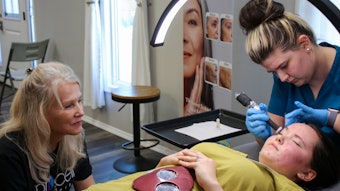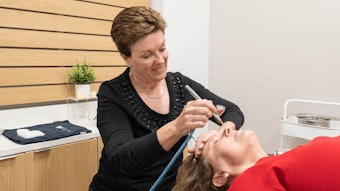The majority of treatment applications currently performed in spas bear little, if any, resemblance to those practiced two decades ago.
Gigantic leaps have been made during the past 20 years, providing a new perspective about aging, and leading the industry in entirely new directions. The once-customary treatment approach of putting forth enormous effort for limited therapeutic results has become dated. Quick, efficient services are not only essential, but are also expected in the modern esthetic workplace. It is understood that treatment providers must be well-organized and highly competent. 
Redefining esthetics
Offering skin care during a time that has been dubbed “The Age of Ideas” demands that procedures are practiced with specialized information and levels of increased intelligence. Due to the changing landscape of the beauty care industry, which is rapidly becoming a cosmecutical-dominated profession, it is up to members of the skin care community to redefine the field of esthetics so that it remains relevant. In order to grow and expand the field, it is important to use powerful analytical skill sets to develop new boundaries of thought.
Challenging treatment norms. Today, skin care professionals must be rich in knowledge so that you can continuously unlock your potential in order to meet the requirements of a whole new sphere of possibilities. Your success depends upon your ability to think outside of the box and to be ingenious. No matter who you speak to about emerging industry trends, most seem to agree that innovative thinking is a hot commodity. The current treatment emphasis is on precision therapy—being accurate without being to dogmatic—which means making skin care applications complete without being overly technical. Mutual collaboration with other skin care professionals is also a key factor.
Raw intellect. Your mind must be clear and razor sharp when you show up for work, or your paycheck will suffer. Lack of advanced education restricts earning potential and stalls what might be a profitable career. Therapeutic complexities make it nearly impossible for undereducated providers to function in a state-of-the-art facility. Esthetic practices require a greater range of capability and an increased vision and understanding because more intricate structures exist in therapeutic applications than ever before.
In the past, too few skin care professionals approached the treatment of the skin with the intent to truly understand the intricacies of what they were doing—a person’s background, emotions and attitude played a big role in how esthetic services were delivered, and information was not as readily available as it is currently. Now, a certain amount of mental skill is required to reason through hard facts and to filter out personal observations. Your intellect helps you to guard against the unsubstantiated opinions of other treatment providers. Practicing skin care in the millennium requires analyzing and drawing conclusions, and you must be able to distinguish between the rational and the irrational.
Transformation in communications. Seriously committed skin care professionals must now acquire stronger communication skills, with a growing emphasis on brevity and tact. Dialogue that runs superiors, co-workers and clients around in circles will no longer be tolerated, especially in clinically centered workplaces—a disconnect in language will result in bewilderment. When miscommunication leads to misunderstanding, the stage could be set for serious treatment complications. The more skillfully you are able to communicate, the more effectively you can make the appropriate connections with others for more successful services.
Evolving viewpoints. Skin care therapy has never been restricted to the mere treatment of the complexion. Estheticians often like to perceive themselves as facilitators of healthier skin and motivators of happier lives. To achieve this image in the minds of your clients, you must encourage positive changes within them. When you take the time to learn about the various viewpoints and fundamental principles of care provided by other professionals who are also aiding your clients, you become more relevant because this synergetic effort allows for all areas of clients’ needs to be addressed. Allied providers can encourage significant self-improvement by motivating them to lose excess weight, work out more to strengthen their bodies and their immune systems, and find emotional balance.
Progressive esthetic methodologies. Another change that is occurring in the field of esthetics is the crossing of boundaries between treatment methodologies. Although it has been reported that organic skin care approaches and modern technological treatment applications are in opposition with one another, nothing could be further from the truth. Progressive esthetic methodology contributes to the justification for holistic remedies as a way to counterbalance their sometimes harsh effects.
Advancements in esthetic technology have actually rekindled an interest in a more natural approach to skin care, with a notable shift toward gentler pure plant extract-based products. These two entirely different treatment applications—once considered polarized approaches—can now be combined, which brings the industry closer to therapeutic fulfillment.
Overview and outlook
There is an enormous difference in esthetic education these days—students are learning how to think, recall easier, create and solve difficult problems. A lack of professional knowledge prompts skepticism and suspicion. Modern technology demands careful attention to your treatment room activities and use of caution with the delivery of your services. Treatment applications must be uncontaminated by personal opinion, and objectivity is harder to achieve than subjectivity. Therapeutic decisions must be sensible and reasonable, and, as always, you must be watchful of wayward service concepts that cloud your good judgment.










